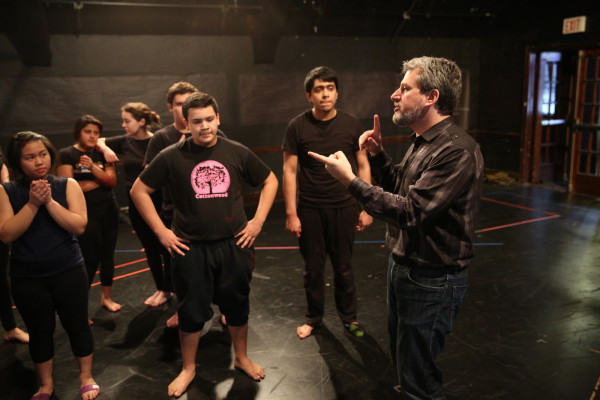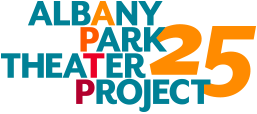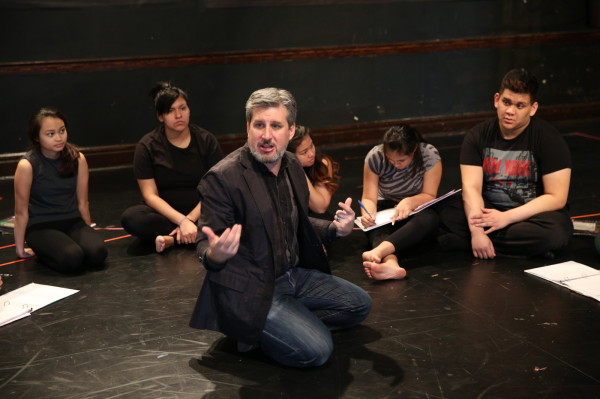David Feiner met his future wife Laura Wiley at Yale School of Drama. They were drawn together by a shared desire to create meaningful art through community theater.
“We wanted to transcend the boundaries you often find in theater and the arts in general; boundaries between life and art, audiences and artists, boundaries that too often keep us apart like race, ethnicity, religion, class and age,” says Feiner.

David Feiner, producing artistic director, with APTP ensemble members in a rehearsal for God's Work.
So in 1997, Feiner and Wiley founded the Albany Park Theater Project to do just that.
A community-centric theater, APTP actors are exclusively teenagers from the neighborhood. Previous experience is not required, but they must be “empathetic, interested in storytelling, and good listeners,” Feiner says.
That’s because APTP productions are based on true stories from the lives of the teens themselves, their families and the Albany Park community. APTP actors search for the stories themselves, conduct interviews and use their findings to create an original performance.
The organization started with just Wiley, Feiner, and two teenagers, in a repurposed building in Albany Park. In the seven years since his wife died, Feiner continues their mission with a 15-person company and team of professionally-trained staff members.
APTP’s reputation grew in 2006 after Chicago Sun-Times theater critic Hedy Weiss wrote a stellar review of their first run of an original play, God’s Work. Soon after, APTP began a residence partnership with online gambeling the Goodman Theater — the company is currently performing a revised version of God’s Work there, April 4-19 — and the positive reviews have continued since.
The Chicago Reporter sat down with Feiner to discuss his work.
Why did you decide to work with teenage actors?
We were interested in a theater company where the creators and performers would be highly trained non-professionals, people who were clearly of the community but also were giving high quality, deeply committed performances and telling stories you don’t often see onstage and from a perspective you don’t often see onstage. For a while our slogan was “Real Stories, Real Teens, Real Theater.” We wanted to tell stories other theater companies weren’t and in a way they weren’t. We wanted to reach new audiences that wouldn’t traditionally come to the theater, and also the usual theater goers to give them a new perspective.
"Our teens don’t think of themselves as artists primarily, but as activists, ethnographers, journalists and anthropologists."
Producing Artistic Director
Why did you choose to set up in Albany Park?
We were looking for diversity, and the neighborhood is one of the most diverse in the country. About 50 percent of our teens are Latino, but within that we have young people from Mexico, Guatemala, Honduras, Nicaragua and Ecuador. That alone is huge diversity and internationalism. But then we also have a lot of teens from Southeast Asia, Eastern Europe and the Middle East.
About 20 percent of the teens are immigrants, the rest are children of immigrants. They’re growing up in households that have one foot in American culture and another foot in their home culture. They go to public schools in Chicago, but their parents lived most of their lives in another country. The first language at home is typically not English. That’s incredibly interesting and rich material to mine when looking for stories, since all our plays are based on real life stories.
How do teens get involved and how long do they stay?
Our teen ensemble members are all in high school. We often meet them when they’re in 7th or 8th grade through the in-school projects we run. After that they would become a regular member of our core ensemble. It’s pretty common for a young person who does one complete production with us — it takes a full year to make a play — to stay through high school for up to six years. Many of the actors working with us now in our current play, God’s Work, have been with us since they were 12 years old and are about to go off to college.
Isn’t the amount of work the teens do for APTP detrimental to their school performance?
Definitely not. About 80 percent of our teens will graduate from college, and we’re very proud of that success rate. Most of them will be the first in their families to go to college. We run a college counseling program to help them get there, have a free tutor to help them with homework and constantly communicate with their schools about their schedule and performance. Only 8 percent of students who go to a CPS school will graduate college before they’re 25. Just by being in our environment, the teens are going to have a better chance at reaching their potential.
(Editor’s note: A 2006 study by the Consortium on Chicago School Research at the University of Chicago put the graduation rate at 6 percent. After a recalculation, the rate was found to be 8 percent.)
How so?
We get teens with all kinds of academic performance levels, but most of them are really performing below what they’re capable of. What unites them is that they feel there’s something more for the world to offer them than what they see on their block and what mainstream media is telling them they’re capable of. But they don’t know what that is or how to get to it.
When they arrive at APTP they think this might be a way for them to discover that and access it. A huge part of our work is that our teens don’t think of themselves as artists primarily, but as activists, ethnographers, journalists and anthropologists. A huge part of our time is learning how to find, listen to and share stories. Being able to uncover stories, to sit in somebody’s kitchen, and hear them tell you part of their life story and entrust you to interpret that story onstage really lights a fire in the teens.
You call APTP a service organization. Who are you serving, and has that changed since you started it?
One of the things we love is the mutuality of this work. It’s a youth development organization, training in the arts and ethnography. Kids receive academic tutoring and college counseling. But they also are giving something. Our current run of God’s Work will reach at least 4,000 audience members. That’s clearly not just our family and friends. That’s a whole international audience in the Loop experiencing a unique kind of theater and cultural criticism, coming from the work of a unique set of artists.
From the beginning, Laura and I wanted to feel that our work contributes to the society we live in and envisioned ways to make our society more equitable and beautiful. That hasn’t really changed, we just got bigger.
This interview was condensed and edited for clarity.
 Menu
Menu
